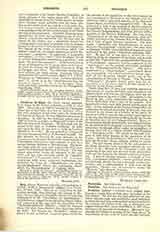

Jorg, JOSEPH EDMUND, historian and politician, b. December 23, 1819, at Immenstadt (Allgau); d. at Landshut, November 18, 1901. The son of a subaltern, he first studied theology, then philology and history at Munich. He was a pupil of Dollinger, and was for years his collaborator in his “Geschichte der Reformation“. In 1852 he was engaged in the Bavarian Record Office, and undertook in the same year the editorship of the “Historisch-politische Blatter”, which he retained (from 1857 with Franz Binder) till a short time before his death. For decades his “Zeitlaufte”, which appeared in this periodical, attracted great attention. On account of his opposition to the Government, he was transferred to Neuburg on the Danube, but was elected in 1863 a substitute member of the Bavarian Lower House, to which he belonged till 1881. He was promoted in 1866 to the position of district archivist at Landshut; from 1868 to 1869 he was a member of the German Zollparlament, and from 1874 to 1879 a member of the German Reichstag. His first work, “Deutschland in der Revolutionsperiode, 1522-26” (1851), a history of the German War of the Peasants, was a work of great literary excellence. The later books, “Geschichte des Protestantismus in seiner neuesten Entwickelung” (1858) and “Die neue Aera in Preussen” (1860), are a collection of separate essays published in the paper “Historisch-politische Blatter”. He was one of the first to realize the true meaning of the development of socialism, and as early as 1867 his “Geschichte der sozialpolitischen Parteien in Deutschland” appeared, having originated in his “Aphorismen” on the socialist movement published in the “Historisch-politische Blatter”. Jorg was a conservative, a “Great German”, a convinced Bavarian monarchist, and a determined but honest opponent of the Bavarian Liberal party and of the subordination of Bavaria to Prussia. The Bavarian “Volkspartei” (People’s Party) grew with his cooperation in a few years from a modest group to a majority in the House (1869).
Under King Max II, Jorg was violently opposed to the ministry of von der Pfordten, as he was also to the alliance made with Prussia (August 22) after the unfortunate issue of the war of 1866. His address to the House in January, 1870, occasioned the resignation of Prince Hohenlohe with a part of his cabinet. But henceforth events took their course uninfluenced by Jorg. At the outbreak of the Franco-German War, he advocated the armed neutrality of Bavaria, but was deserted in the House by a number of his party; he was thus unable to prevent his country’s participation in the war and the entrance of Bavaria, by the Treaty of Versailles, into the new German Empire. However, he afterwards loyally accepted the new order of things. In the Reichstag his proposal to call a meeting of the committee for foreign affairs under the presidency of Bavaria gave rise to a violent conflict with Bismarck on December 4, 1874. His attack on the Lutz ministry in 1875 failed because of the opposition of the Crown. He left the Reichstag in 1879, and two years later the Bavarian House, thereby ending his public life. The last twenty years of his life were passed on the Burg Trausnitz near Landshut (whence he was known as the “Hermit of the Trausnitz”), and the remainder of his days was devoted to his journalistic work and his duties in the district archives of Lands-hut. A man of stainless honor, a Catholic of firm faith, a prominent politician, a sound political writer and thorough scholar, he was a strongly marked personality, and is acknowledged as such even by his opponents. Besides his above-named works his “Memoirs” also deserve mention.
HERMANN CARDAUNS

